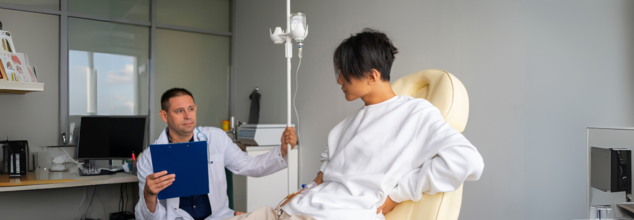- Health Conditions A-Z
- Health & Wellness
- Nutrition
- Fitness
- Health News
- Ayurveda
- Videos
- Medicine A-Z
- Parenting
- Web Stories
Bizarre Medical Case: Teen Without Vaginal Opening Becomes Pregnant, Stuns Doctors

Credits: Canva
There are many bizarre medical cases and medical mysteries, but this is something you may not have heard before. This is the story of a 15-year-old girl form Lesotho, a country within South Africa, who became pregnant without having any vaginal opening.
How Did She Know About Her Pregnancy?
The girl was admitted in the hospital due to the complaints of abdominal pain. Tests revealed that she was nine month pregnant. What came as a shocker that she had no vaginal opening, thus never had sexual intercourse. This left doctors amused, wondering how she may have gotten pregnant? She had a rare birth defect called distal vaginal atresia.
What is Distal Vaginal Atresia?
This is condition where the vagina is closed or absent. This condition occurs with other developmental problems in a female baby. Most often the baby also has Bardet-Biedl syndrome, Fraser Syndrome or Rokitansky-Mayer-Küster -Hauser syndrome.
Bardet-Biedl syndrome is a rare disorder affecting many parts of the body. Loss of vision, obesity, kidney problems and intellectual disorders are common characteristics of the syndrome.
Fraser syndrome is a rare disorder affecting development starting before birth. Babies born with Fraser syndrome typically have eyes that are completely covered by skin and usually malformed, fingers and toes that are joined together, and abnormalities of the urinary tract.
Mayer-Rokitansky-Küster-Hauser (MRKH) syndrome is a disorder in females causing the vagina and uterus to be underdeveloped or absent. It is often associated with kidney anomalies. This condition often accompanies a cloacal malformation, the surgical treatment which includes a variety of vaginal replacement techniques.
People with distal vaginal atresia do have menstruation, but the blood does not exit, which forms blockage and buildup within the uterus. This condition is called hematometra or hematocolpos, which can cause pelvic pain and discomfort.
This is a rare condition which affects 1 in 10,000 to 15,000 female children.
How Did She Become Pregnant?
While her body does not have a vaginal opening, but she does have a uterus, which means she can get pregnant if semen is injected and fertilized through in-vitro fertilization. However, this was not the case with her.
The girl later revealed that while she did notice her body change, she "did not believe she was pregnant." However, when she was told she was pregnant, she delivered her child though a C-section delivery.
In later interviews, she revealed that she had suffered stab wounds to her abdomen shortly after she had performed oral sex on her partner. At that time she confided in a nurse that her ex-partner had violently attacked her, when he found her in act with the current partner.
The medical team that attended her then concluded that it could be due to the stomach would which may have allowed the sperm she swallowed to reach her reproductive organs. This may have resulted into an unexpected conception.
Another shocker is that sperm does not survive in the digestive acid that stomach produces. However, the doctors believe that the sperm may have survived as at that time the girl was malnourished and the acidity levels in her digestive system may be low.
Untimely Rainfall Leaves The Country Prone To These Infectious Diseases

Credits: Canva
India is no stranger to the monsoon, but in recent times, untimely rainfall, during the summers has become a recurring and worrying pattern. Sudden downpours and extended wet spells, often hitting before or after the traditional monsoon season, have created favorable conditions for a surge in seasonal diseases. Public health experts are increasingly concerned that this erratic weather is putting millions of Indians at risk, particularly in urban areas where poor drainage and sanitation aggravate the problem.
Why Untimely Rainfall Is a Health Hazard
Unseasonal rains lead to prolonged humidity and stagnant water, two ideal conditions for the breeding of disease-carrying mosquitoes and the spread of bacteria and viruses. Overflowing drains, waterlogged streets, and contaminated water supplies become hotspots for infection. With climate change making such weather more frequent, India’s already burdened healthcare system faces further pressure during the monsoon and beyond.
Here Is a List of 10 Most Common Monsoon Diseases:
Dengue
Spread by the Aedes mosquito (often called the tiger mosquito), dengue is the most widespread monsoon disease. To prevent bites, apply mosquito repellent gel or lotion regularly.
Symptoms:
- High fever
- Swollen lymph nodes
- Skin rashes
- Headache
- Low platelet count
- Hypersensitivity
Chikungunya
Caused by mosquitoes that breed in stagnant water, often in overhead tanks, coolers, or unused containers.
Symptoms:
- Intense joint pain
- High fever
- Fatigue
- Chills
Malaria
Another mosquito-borne illness that spikes during monsoon due to waterlogging.
Symptoms:
- Recurring high fever
- Chills and sweating
- Body ache
- Severe anemia
Cholera
Caused by consuming contaminated food or water, particularly where sanitation is poor.
Symptoms:
- Dehydration
- Muscle cramps
- Low blood pressure
- Rapid heartbeat
- Loss of skin elasticity
Typhoid
A highly contagious bacterial disease, often resulting from unhygienic food and water.
Symptoms:
- Prolonged high fever
- Weakness
- Abdominal pain
- Vomiting
Viral Fever
Common during monsoon, this illness spreads easily due to temperature fluctuations and humidity.
Symptoms:
- Fever
- Fatigue
- Chills
- Muscle and joint pain
- Inflammation of the throat
Diarrhea
Typically caused by unhygienic food or water, diarrhea can become dangerous if left untreated.
Symptoms:
- Watery stools
- Abdominal cramps
- Fever
- Nausea
Influenza
Fluctuating weather often leads to cold and flu symptoms, which can spread quickly.
Symptoms:
- Fever
- Muscle ache
- Headache
- Nasal congestion
- Persistent cough
Leptospirosis
Transmitted from animals to humans, this bacterial infection becomes common in waterlogged areas.
Symptoms:
- High fever
- Headache
- Red eyes
- Abdominal pain
- Rashes
Stomach Infections
Caused by the consumption of unhygienic food, leading to infections like gastroenteritis.
Symptoms:
- Nausea and vomiting
- Abdominal cramps
- Diarrhea
- Low-grade fever
Staying Safe During the Monsoon
As India grapples with climate change-induced weather patterns, it is essential to stay prepared. Avoid street food, drink only boiled or filtered water, and use mosquito repellents. Basic hygiene practices like washing hands regularly and ensuring proper sanitation can go a long way in protecting yourself and your family during this unpredictable season.
You Can Reduce Dementia Risk By Walking Only These Number Of Steps

(Credit-Canva)
Many of us aim for 10,000 steps a day, but new research suggests you might not need to walk quite that much to help lower your risk of dementia. A study using wearable trackers found that even fewer steps can make a real difference. Experts have shared that taking 9,800 steps a day can reduce your dementia risk. What's even better is that you get half of that benefit by just taking about 3,800 steps, or around 4,000. This is great news, as it's a more achievable goal for many people looking to boost their brain health.
It's not just about how many steps you take; how you walk also matters. The study on walking and dementia risk showed that taking purposeful steps and walking with more intensity, like a brisk walking pace, were linked to a lower risk of dementia. So, a faster walk is more helpful than a slower walk. Experts also highlighted the benefits of walking in groups, especially for older adults. Walking with others can build social connections, improve your mood, and fight off feelings of loneliness, all of which are important for your overall well-being.
How Exercise Impact Dementia Risk?
Not being active enough is a big risk factor for dementia, studies have consistently shown that regular exercise for middle-aged and older adults can improve thinking and memory and lower the chances of getting dementia. The charity suggests getting about 20 to 30 minutes of aerobic exercise, which is any activity that gets your heart rate up. This can include everyday things like brisk walking, cleaning, or gardening, making it easy to fit into your daily life.
Can More Physical Activity Prevent Dementia?
The NHS also strongly supports the idea that being physically active helps prevent dementia. They explain that not exercising enough can increase your risk of heart disease, becoming overweight, and developing type 2 diabetes – all factors that can raise your dementia risk. Older adults who don't exercise are also more likely to have problems with their memory or thinking.
The NHS suggests at least 150 minutes of moderate-intensity physical activity each week. This could be brisk walking, cycling, or dancing. They also recommend strengthening exercises twice a week, like gardening or yoga, and encourage you to move regularly throughout the day, even by taking the stairs or standing during phone calls.
Colon Cancer Is Rising In Millennials- But This One Symptom Still Feels Too Embarrassing To Talk About

Credits: Canva
Colorectal cancer, once considered a condition affecting primarily those over the age of 50, is no longer limited to aging adults. The disease is increasingly affecting younger adults—millennials and even members of Gen Z. A report by American Cancer Society reveals that every generation of people born after 1950 is experiencing a higher risk of colorectal cancer, a trend that has left researchers and medical professionals stunned.
The disease, which includes both colon and rectal cancers, is growing most rapidly in adults 20 to 39 years old, with a 2% average annual rate of increase in incidence since the mid-1990s. This epidemiologic transition is causing legitimate public health alarms—and at the core of the crisis is an alarming fact: the most likely symptom of colon cancer is one that many will be too ashamed to discuss.
One Symptom That Should Never Be Ignored
In a 2024 study by Joshua Demb, assistant professor and researcher of early-onset colon cancer at the University of California, San Diego, rectal bleeding was the most specific and common early symptom in young adults with colorectal cancer. And yet, it's the one that many people—particularly millennials—are least likely to mention.
Through his interviews with patients, Demb discovered a shared pattern- patients held off on coming in for care because they were embarrassed to discuss "poop" or blood in their stool. This resistance is not anecdotal alone—it is a deeper cultural taboo dating back centuries, especially in Western cultures where bathroom behavior has always been tainted by shame.
Blowing off blood in the toilet or denying pencil-thin stools as benign gastrointestinal problems might cost lives. "When young adults finally come forward, their cancer has usually advanced beyond it should have," Demb said. "Shame about bowel movements can add to delay in diagnosis in a disease where timing is everything."
Why Young People Are at Greater Risk?
Although colorectal cancer is still a slow-growing cancer, specialists caution that its increase among young adults may be the result of both genetic susceptibility and lifestyle choices.
Dietary patterns including high consumption of red and processed meats, low fiber intake, physical inactivity, increased prevalence of obesity, and higher alcohol and tobacco consumption are all potential drivers of this trend. The World Cancer Research Fund suggests aiming for less than 18 oz per week of red meat and focusing on a high-fiber, plant-based diet to lower the risk of colorectal cancer.
"We're observing increasingly urbanized, digitally connected young patients with rapid food intake, extended sitting times, and minimal physical activity," says Dr. Maria Ellis, an oncologist who specializes in gastrointestinal cancers. "These habits likely lead to inflammation and alterations in the gut microbiome, all conducive to the initiation of early tumors."
The Challenges with Current Screening Guidelines
One of the largest updates to solving this health crisis is screening age eligibility. Routine colonoscopies are suggested beginning at age 45 to 50 in most countries, including the U.S. But if the demographic that is growing quickest is under 40, this model is already outdated.
Even when young adults come with typical presentations—chronic abdominal pain, change in bowel habits, or bleeding per rectum—the suspicion of cancer is usually ignored by patients and doctors. Colonoscopies are painful, costly (several thousand dollars without insurance), and seldom prescribed for individuals in their twenties or early thirties unless there is a family history.
"There's still a lingering thought among primary care doctors that cancer is an 'older person's disease,'" says Dr. Ellis. "That results in young patients being misdiagnosed with hemorrhoids, irritable bowel syndrome, or anxiety-related gastrointestinal issues."
Psychological Burden on Young Adults
For young adults and adolescents (AYA), a cancer diagnosis disrupts not only health, but also identity, education, relationships, and planning for the future. A 2025 study presented at the American Society of Clinical Oncology (ASCO) identified four core areas of support lacking in AYA cancer treatment: academic accommodations, loss of extracurricular activities, disruption of career trajectory, and loss of peer affiliation.
This age group is typically just starting out in their adult lives—beginning careers, dating, or establishing families. Stigma of "poop talk" creates another layer of loneliness and humiliation, compounding the delay in diagnosis and treatment.
How to Identify a Red Flag?
Many of the initial symptoms of colon cancer will look like other diseases like celiac disease, irritable bowel syndrome, or hemorrhoids. But the most important clue to look for is a change from your usual pattern of digestion. If your bowels suddenly change—and remain changed—it's time to see a doctor.
Other signs include:
- Rectal bleeding
- Unexplained abdominal pain
- Chronic diarrhea or constipation
- Pencil-thin stools
- Fatigue or unexpected weight loss
Young adults should not be afraid to speak up for themselves in doctor's offices, even when they do not have a family history of cancer. A second opinion, particularly in the case of a persistent symptom, can be the difference between life and death.
Why Talking About Stool Could Be Life-Saving?
The cultural shame of defecation runs deep—but it's time to break it. Public health initiatives need to incorporate plain language that de-stigmatizes important bodily functions. As Dr. Demb says, "Normalizing conversations about poop isn't just cute or quirky—it's a serious tool in cancer prevention."
Parents, teachers, influencers, and physicians need to all join together in promoting a culture that favors openness regarding gut health. Vocabulary such as "stool" or "rectal bleeding" should not be masked in euphemisms. Millennials, the group that has spearheaded mental health activism and sexual health education, are perfectly placed to help break down this barrier.
Millennials are confronted with an unprecedented health threat that calls for urgency, awareness, and action. Early-onset colon cancer is not only a health problem—it's a cultural one, driven by stigma, misinformation, and outdated screening practices.
© 2024 Bennett, Coleman & Company Limited

